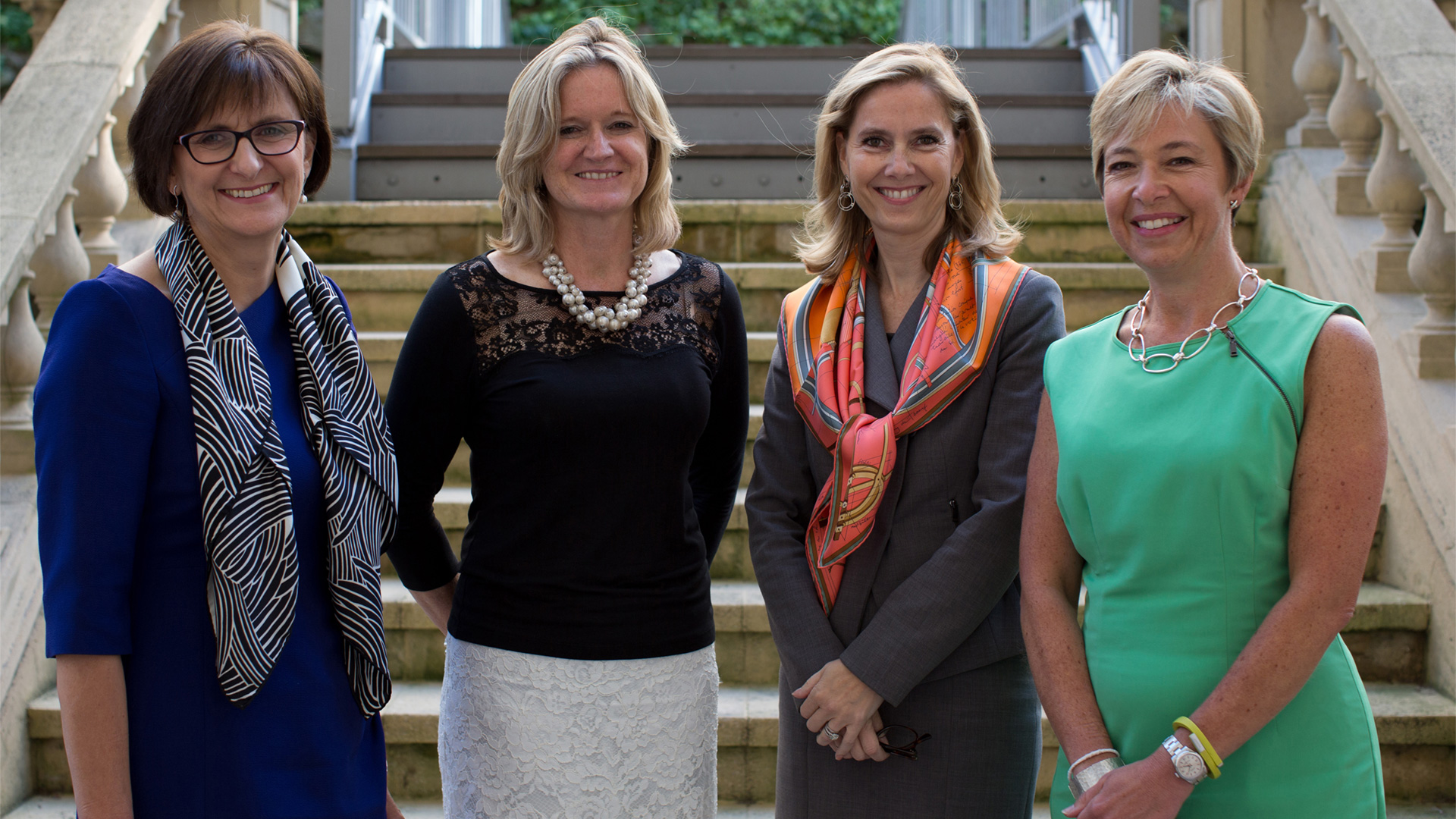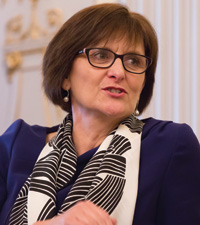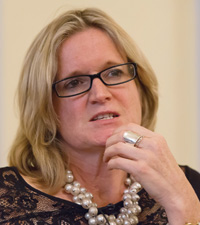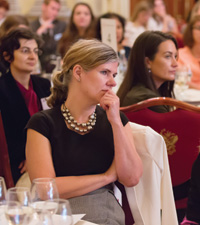
Over the past several years, significant progress has been made towards addressing legacies of gender inequality, with a loud and inspiring global push for diversity. The third annual Treasury Today Women in Treasury Forum, held in London in September, looked to further that push, and tackle the issues around gender equality in the treasury department and beyond.
It is staggering to think that, in 2015, we live in a world where gender inequality is still a big issue. In fact, recent data from global consulting firm, Mercer, highlights just how serious this is. Their research has shown that, at the current pace, female hiring, promotion and retention rates will be insufficient to adequately advance gender equality within the next decade.
Whilst statistics such as these can be disheartening, the recent Treasury Today Women in Treasury Forum held at Plaisterers’ Hall in the City of London, highlighted that there is plenty of room for positivity and that with determination and purpose, real change can be delivered. With over 200 leading treasury and finance professionals in attendance, the room was abuzz during the pre-lunch networking session as guests made acquaintances whilst sharing their own personal experiences and stories. It was particularly inspiring to hear how some of those who have attended previous Women in Treasury events have been able to use it as a platform to drive change in their career or organisation.

Despite these success stories, the keynote address delivered by Angela Berry, Treasury Today Group Publisher and Founder of the Women in Treasury initiative, highlighted that a gulf still exists between the sexes in the industry. Referencing the results of Treasury Today’s Global Women in Treasury Study 2015, supported by RBS, Angela informed a shocked audience that 34% of female corporates surveyed feel they are paid less than their male counterparts and 44% don’t think they have the same career prospects. Another interesting statistic was concerning the ever-contentious topic of quotas: for the first time since the study began, more women were in favour of them than against, with the consensus seeming to be that these may help to push gender equality over the finish line.
It was encouraging to see that more women surveyed this year stated that they aspired to reach senior roles such as Finance Director and CFO. To be able to achieve this however, our message is that women and men have an ongoing duty to empower, support and celebrate the successes of one another.
Reaching the top
Given these findings, it seemed poignant that the first topic to be discussed during the panel session was career progression and how women can reach the top. Debra Todd, VP Global Treasury Services at BP, who with 29 years’ experience in the industry was well placed to discuss the topic, kicked off the debate.

According to Debra, the onus when looking to get ahead falls firmly on the individual and there are a few simple steps that can be taken to make this happen. “First and most crucial is being visible – for the right reasons,” she said. This extends beyond simply turning up to work and being good at your job. To truly get ahead, Debra believes that you need to build a reputation of being someone who knows their own mind and is not afraid to speak up. This includes identifying problems, offering solutions, and most importantly taking ownership.
Of course, being assertive is not always easy, especially for young professionals. Debra therefore urges women to be brave. “The glass ceiling which exists for women can often be self-imposed because of a tendency to self-limit,” she says, “being brave can remove this and allow you to take significant strides forward in your career.” To be able to achieve this, with confidence, Debra stresses the importance of career planning: “This is crucial in providing clarity in thought, helps to builds trust in your convictions and also allows you to open doors, rather than crashing into them.”
Debra’s final word of advice was on the importance of establishing a robust support network outside of the office. Of course, there is no one right way to do this so it is a matter of making your arrangements work for you. “If you need flexible working arrangements then don’t be afraid to ask,” she concludes.
The parent trap
Flexible working is a mainstay in the debate around children and parenting. Yet, it is clear that parenthood is not a gender specific issue, both men and women have equal responsibility to look after their children. Nevertheless, there is a perception that men can be successful with, or without children, whereas women may have to make the choice.
Brenda Trenowden, Head of FIG Europe & Head of Banks & DF, Americas at ANZ and Global Chair of the 30% Club – an organisation with a goal of achieving 30% women on FTSE 100 boards by end 2015 highlighted this perception, citing a study titled ‘The Maternal Wall’. “The study concluded that businesswomen are typically seen to be high in competence. But working mothers are rated less like businesswomen and more like housewives, who – to quote the terms used by researchers – are viewed as on a par with the elderly, blind, and disabled.”

What is more, this perception has manifested itself in reality. As Brenda explained using data from Australia, “an average 25-year-old man can expect to earn a lifetime total of $2m, if he doesn’t have children. If he does have children, this figure is bumped up to $2.5m. It doesn’t, however, work the same for women – a childless woman can expect to earn as much as her male childless counterpart, but if she has children, it declines.” In Brenda’s view, these statistics are simply down to societal norms and perceptions that have become engrained over history – men have traditionally been seen as the breadwinners and women as the carers. Yet, despite these gender roles no longer being quite so cut and dried, there remains an unconscious bias that exists which may have helped to form a dominant culture across society, typically with men at the top.
How can this unconscious bias be shattered? Firstly, reiterating what Debra said, there need to be more female role models that are willing to stand up and be counted. In addition, women (and men) need to be brave and call out these biases when they occur, so that people recognise what is happening. Employers also have a role to play and can offer unconscious bias training to help people identify the bias that exists within themselves. To fully escape the parent trap agile working is the key. “This needs to be something that is offered to everybody, as both men and women need flexibility to not only be a parent but also to meet their other responsibilities and take time for themselves. Throughout my career I have encouraged this and it can help the team deliver exceptional results.”
All things being equal
Offering equal opportunities to both men and women for flexible working is something that Jo Hawkes, Group Treasurer at Marks and Spencer would also support. She observed that for real equality at work, there also needs to be opportunity for men to have equality at home.

Jo also suggested the work place has generally changed for the better in the past few decades. “As my career has progressed, I have witnessed more women working and at more senior levels,” she says. “Whilst most of us thought it was a very progressive place at the time, the workplace was different 30 years ago. Some of the attitudes and occasional behaviours that were just tolerated then wouldn’t be countenanced today. The workplace dynamics between men and women have changed for the better. It’s a more professional place.”
Against the backdrop of this progress, Jo was surprised when Angela announced the statistics from the Women in Treasury Study which reported the strong perceptions of disadvantaged pay and career opportunities for women in the workplace. Jo also considered the concept of the “unconscious bias”. “Whilst there may be no prejudices effecting conscious behaviour in the work place perhaps some of our more engrained attitudes were influencing us, more than we may be aware,” she said.
Jo contemplated on some of the ideas that Sheryl Sandburg COO of Facebook had put forward in her book titled ‘Lean-In’ that women can lack some of the characteristics that could help progress their career. For instance, lower levels of self-confidence and a willingness to self-promote and take risks could be a contributing factor to a lack of women in leadership positions. In this respect, Jo thought women could consider observing some of these characteristics in practice and applying them to their own working life. “However, in my experience, many women were already doing so,” she said. “But real gender equality should also be characterised by acknowledging the value of the typically female traits such as communication, modesty, diplomacy and empathy.”
Of course, companies could do more to promote women. This cannot only drive equality, but also offer positive financial impacts to the business. Indeed, Jo made reference to a report from McKinsey & Co, ‘Diversity matters’, which showed there was substantial evidence to support the idea that gender equality was really good for business. The report noted that companies in the top quartile of gender diversity were 15% more likely to have financial returns that were above their national industry median. If this isn’t enough for companies to take action and promote gender diversity, then what is?
Team building
Aside from delivering financial benefits, promoting gender diversity is a key requirement when building a talented team. This was the view of Jennifer Boussuge, Managing Director, Head of Transaction Banking EMEA at Bank of America Merrill Lynch, the final panel speaker. Jennifer believes that the key to attracting and retaining the best people is creating an environment where people can deliver their best.
For the most part, the blocks which help build a best-in-class working environment are relatively simple. These include: allowing workers to be themselves, providing openness and transparency, utilising the strengths of each individual, offering rewarding work and also having rules that people cannot only adhere to, but also believe in. Achieving these however is not an easy task. As Jennifer explained: “Few companies exemplify all of these. Some of the attributes conflict and many are complicated, costly, or time-consuming to implement. Almost all of them require leaders to carefully balance competing interests and reallocate their time and attention.” It is therefore crucial, in her opinion, that executives spend time focusing on these as it is their responsibility to set the tone for the rest of the team and ensure that employees are given adequate room and encouragement to flourish in the workplace.

However, with teams made up of people with different motivations and personalities, getting it right can be difficult and this is exacerbated by the fact many leaders are ill-equipped to manage effectively. “As a result, many managers make fundamental mistakes such as unknowingly undermining employee performance,” says Jennifer. “Studies have shown that line managers directly influence a majority of the key drivers of employee performance, improving or destroying performance by up to 40%. Whilst managers can improve employee performance by emphasising employee strengths in performance reviews, they can also undermine employee performance by making frequent changes to projects and assignments.”
Developing a management philosophy and style that is based on emotional intelligence and a deep understanding of the team is therefore crucial. At the heart of this philosophy sits the communication channels that exist between employees and their managers. Studies have shown that this is the single most important driver of employee performance. “This can be as simple as saying ‘thank you’, or ‘good job’,” adds Jennifer, “this doesn’t cost anything but can have a real impact on performance and employee morale.”
Thoughts from the floor
The Women in Treasury Forums are not just a place to hear what the panellists have to say, but also a chance for attendees to share their own stories and ask questions. After the panel’s initial topic-led discussions, there was a lively question and answer session during which mentoring, biggest mistakes (and what was learnt from these), bravery and the impact of age on a career were all frankly debated.
Following this, the room again became alive with discussion as the attendees deliberated what had been said. From these conversations, it was clear that what was discussed by the panel resonated with those in the room. As Christine Elam, International Treasury Manager, The Body Shop International says: “When you hear people talking about many of the same issues that you go through in your head and that you experience in the workplace, it is reassuring that other people are experiencing and thinking the same. It confirms your feelings.”
It was also confirmed that real progress is being made in the field of gender equality and that this needs to be maintained. “Aren’t we awesome!” says Jennifer Tinsley, Treasury Director – Treasury Eurasia at Joy Global. “Women have made more senior posts than the previous year, but we do need to ensure that we continue to promote a greater mix of age and gender in the workplace and not replicating the status quo. This is how we generate new business, build a better economy.”

Pushing oneself and being confident is something that all professionals, especially those in the early years of their career need to do to help achieve this. “Women need to be brave, stand up for themselves and speak out when there is inequality,” said Louise Darley, Bank Payments Supervisor at Easyjet. Her colleague, Jade Steele, Treasury Analyst at Easyjet agrees that this will help: “This will help build confidence and encourage women to apply for the roles they may have previously dismissed because they didn’t think they were good enough. As a result there should be an increase in the number of women applying for senior roles and actually getting them!”
Speaking up will also help companies realise the need to offer flexible working, enabling both men and women to have a better work life balance. “This is very important,” says Jiameng Yu, Assistant Treasurer at Vodafone Group plc World HQ, “due to the nature of treasury, there is very little one can do about workload, but flexibility is what makes a difference. Specifically, companies need to realise that employees do not need to be at their seat to be delivering.” To do this, leaders need to step up. “I think young women need role models to aspire to. Even today, girls are still generally expected not to be too ‘smart’ and certainly not too ‘assertive’ (aka – aggressive, even though the two are not the same thing),” adds Jiameng, “I think it is important for those who have ‘made it’ to show young women/girls that there is light at the end of the tunnel.”
It seems, based on the discussions on the day, that this is an exciting and promising moment in history where real progress on gender diversity is clearly being made. However, we are not there yet, and business leaders (both male and female) have an ongoing duty to empower, support and celebrate the successes of women in our industry.
Join the debate
We frequently profile female trendsetters in Treasury Today and Treasury Today Asia, looking at their professional development and career-defining moments, as well as providing advice to those just starting out in the profession. We also host a Women in Treasury LinkedIn group providing a dedicated platform for discussion, debate and support – to join this group please email sarah.arter@treasurytoday.com